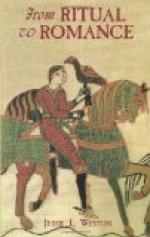The Perlesvaus, in its present form, appears to be a later, and more fully developed, treatment of the motif noted in Chrétien, i.e., that the misfortunes of King and country are directly due to the Quester himself, and had no antecedent existence; this, I would submit, alters the whole character of the story, and we are at a loss to know what, had the hero put the question on the occasion of his first visit, could possibly have been the result achieved. It would not have been the cure of the King: he was, apparently, in perfect health; it would not have been the restoration to verdure of the Land: the Land was not Waste; where, as in the case of Gawain, there is a Dead Knight, whose death is to be avenged, something might have been achieved, in the case of the overwhelming majority of the Perceval versions, which do not contain this feature, the dependence of the Curse upon the Quester reduces the story to incoherence. In one Perceval version alone do we find a motif analogous to the earlier Gawain Bleheris form. In Manessier the hero’s task is not restricted to the simple asking of a question, but he must also slay the enemy whose treachery has caused the death of the Fisher King’s brother; thereby healing the wound of the King himself, and removing the woes of the land. What these may be we are not told, but, apparently, the country is not ’Waste.’[13]
In Peredur we have a version closely agreeing with that of Chrétien; the hero fails to enquire the meaning of what he sees in the Castle of Wonders, and is told in consequence: “Hadst thou done so the King would have been restored to health, and his dominions to peace, whereas from henceforth he will have to endure battles and conflicts, and his knights will perish, and wives will be widowed, and maidens will be left portionless, and all this because of thee."[14] This certainly seems to imply that, while the illness of the Fisher King may be antecedent to, and independent of, the visit and failure of the hero, the misfortunes which fall on the land have been directly caused thereby.
The conclusion which states that the Bleeding Head seen by the hero “was thy cousin’s, and he was killed by the Sorceresses of Gloucester, who also lamed thine uncle—and there is a prediction that thou art to avenge these things—” would seem to indicate the presence in the original of a ‘Vengeance’ theme, such as that referred to above.[15]
In Parzival the stress is laid entirely on the sufferings of the King; the question has been modified in the interests of this theme, and here assumes the form “What aileth thee, mine uncle?” The blame bestowed upon the hero is solely on account of the prolonged sorrow his silence has inflicted on King and people; of a Land laid Waste, either through drought, or war, there is no mention.
“Iuch solt’ iur wirt erbarmet hân,
An dem Got wunder hât getân,
Und het gevrâget sîner nôt,
Ir lebet, und sît an saelden tôt."[16]




